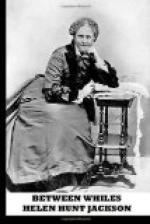Wilhelm was buried in a corner of the meadow field he had so loved. Before two years had passed, wild blackberry vines had covered the grave with a thick mat of tangled leaves, green in summer, blood-red in the autumn. And before three more had passed there was no one in the place who knew the secret of the grave. Farmer Weitbreck and his wife were both dead, and the estate had passed into the hands of strangers who had heard the story of Wilhelm, and knew that his body was buried somewhere on the farm; but in which field they neither asked nor cared, and there was no mourner to tell the story. John Weitbreck had realized his dream of going West, a free man at last, and by no means a poor one; he looked out over scores of broad fields of his own, one of the most fertile of the Oregon valleys.
Alf was with him, and Carlen; and Carlen was Alf’s wife,—placid, contented wife, and fond and happy mother,—so small ripples did there remain from the tempestuous waves beneath which Carl Lepmann’s life had gone down. Some deftly carved boxes and figures of chamois and their hunters stood on Carlen’s best-room mantel, much admired by her neighbors, and longed for by her toddling girl,—these, and a bunch of dried and crumbling blossoms of the Ladies’ Tress, were all that had survived the storm. The dried flowers were in the largest of the boxes. They lay there side by side with a bit of carved abalone shell Alf had got from a Nez Perce Indian, and some curious seaweeds he had picked up at the mouth of the Columbia River. Carlen’s one gilt brooch was kept in the same box, and when she took it out of a Sunday, the sight of the withered flowers always reminded her of Wilhelm. She could not have told why she kept them; it certainly was not because they woke in her breast any thoughts which Alf might not have read without being disquieted. She sometimes sighed, as she saw them, “Poor Wilhelm!” That was all.
But there came one day a letter to John that awoke even in Carlen’s motherly and contented heart strange echoes from that past which she had thought forever left behind. It was a letter from Hans Dietman, who still lived on the Pennsylvania farm, and who had been recently joined there by a younger brother from Germany.
This brother had brought news which, too late, vindicated the memory of Wilhelm. Carlen had been right. He was no murderer.
It was with struggling emotions that Carlen heard the tale; pride, joy, passionate regret, old affection, revived. John was half afraid to go on, as he saw her face flushing, her eyes filling with tears, kindling and shining with a light he had not seen in them since her youth.
“Go on! go on!” she cried. “Why do you stop? Did I not tell you so? And you never half believed me! Now you see I was right! I told you Wilhelm never harmed a human being!”
It was indeed a heartrending story, to come so late, so bootless now, to the poor boy who had slept all these years in the nameless grave, even its place forgotten.




